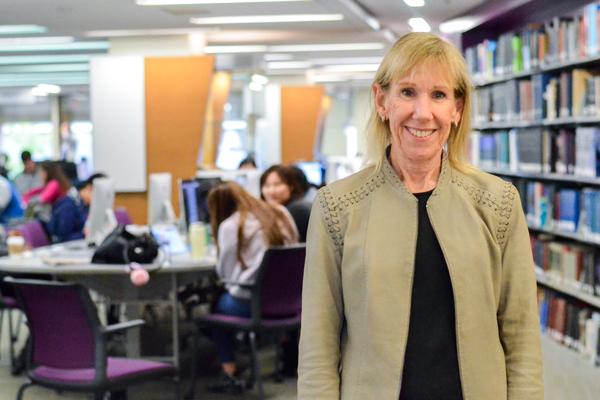A new permanent lab in Gelman Library will give math, science and engineering students a place to brush up on their coding and software skills.
The Quantitative and Spatial Reasoning Lab, which will open next semester, is designed as a central space for tutoring and workshops in science, technology and mathematics skills and applications, and students can use it in the same way they use the University Writing Center to sharpen writing skills.
Geneva Henry, the dean of libraries and academic innovation, said the lab will be located on the entrance floor of Gelman in what is currently a multimedia lab. After some of the computers are moved out, there will be room for tutoring, consultations and workshops, Henry said.
“STEM now pervades every discipline, it’s all data and what you can do with it,” Henry said. “We can bring it all together now, and that’s really exciting”
The lab will be a space where STEM students can get help from departments’ learning assistants, attend skill-building workshops, use computer applications that are not available on most computers and work with their peers, she said.
Henry said the University likely will not create any new positions to staff the lab but will instead rely on the help of STEM-experienced faculty and learning assistants in the School of Engineering and Applied Science and the Columbian College of Arts and Sciences.
Although workshops in GIS – Geographic Information Systems, a program used by geographers – and statistics are already available at Gelman, Henry said they take place in scattered classrooms wherever the software is available, and consolidating them in one location should make the resources more visible.
“It’s a matter of establishing that as the place where you can go get some help,” Henry said. “When you come in and need some help with statistics or other quantitative types of things, or GIS, or working on a project, or to come into that space and be able to identify that as that’s where you go.”
Though the new lab has not been widely publicized yet, some faculty and students say the space could fill a void of resources that are currently not available to students outside classrooms.
Maria Gualdani, an assistant professor of mathematics, said that although the computer science department offers some courses that teach students programming languages, offering workshops could give students who are not in those courses the chance to learn computer skills.
Gualdani said she would like the lab to serve as a resource for student organizations devoted to math or science, as well as for individual students. She is the faculty adviser for the GW Association of Women in Mathematics and said the group often struggles to find computer lab space to practice coding.
“As a chapter they are able to book standard rooms for meetings, but absolutely no way they could book a lab with computers,” Gualdani said. “I found it quite ridiculous, because for me it’s very important that women and everybody learn how to code. The University didn’t try to help and encourage them doing it by themselves.”
Lorena Barba, an associate professor of mechanical and aerospace engineering, her students commonly lack computing skills. Although students are apt at navigating email, photo managers and music players, Barba said they need “professional-grade competency” in using command-line utilities, coding and other skills to effectively use computers to solve problems.
Barba said that the lab would be of “great value” to all students, not just those in STEM fields. Computing and coding skills, like writing, should be incorporated into all curricula, she said.
“There is huge demand for computationally skilled graduates, no matter the major,” Barba said. “We can add tremendous value to a GW degree if all students have support and are encouraged not only to learn coding but to become confident with computers as a tool for their profession.”
GW is not the first university to create a STEM lab – similar resources have popped up at other universities over the past 10 years. Experts say that these labs have been helpful for STEM students who thrive in small-group settings or who need extra time to grasp complicated concepts.
Janeen Madison, the STEM Lab Coordinator at Pennsylvania State University, said a lab can help students improve their performances in math and science classes.
Like GW’s lab, the one at Penn State is located on the entrance floor of the campus library. Madison said the lab’s convenient location near other academic resources, like library collections and the writing center, encourages students to utilize it.
“It becomes an academic hub where they can get help in all those areas,” Madison said. “Students find that this is the corner of the library where they can get any academic help.”
Rachel Ventresca and Avery Anapol contributed reporting.







